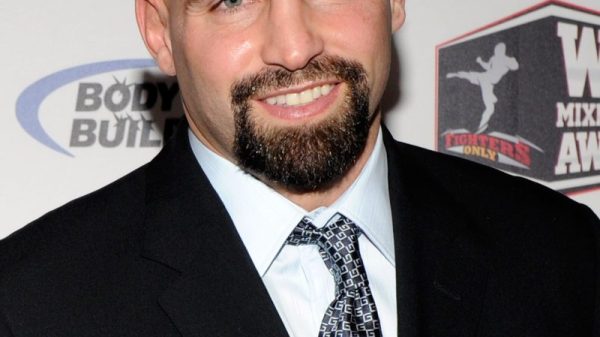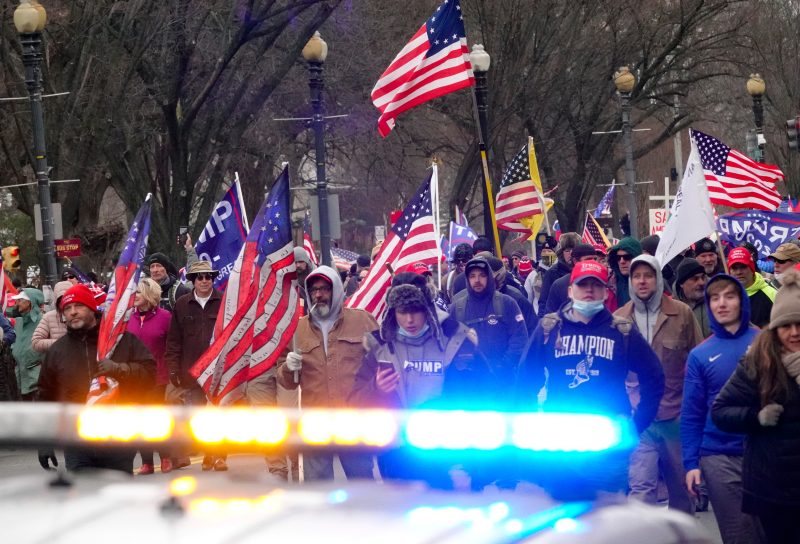A felony statute criminalizing obstruction of government proceedings can be used to prosecute members of the mob that stormed the U.S. Capitol on Jan. 6, 2021, a federal appeals court ruled Friday.
The decision empowers prosecutors pursuing hundreds of cases involving participants in the Capitol riot, while blessing an interpretation of the law that both judges and lawmakers have argued applies to former president Donald Trump. But it also split the three-judge panel and left key questions open for future court challenges.
Judge Florence Y. Pan, a President Biden appointee, and Judge Justin Walker, a Trump appointee, ruled together for the government, despite a partial disagreement. Judge Gregory G. Katsas, also a Trump appointee, dissented.
While federal guidelines generally call for far lower sentences, obstruction of an official proceeding carries a potential penalty of up to 20 years in prison. A misdemeanor conviction for trespassing or illegally demonstrating in the Capitol garners a sentence of a year at most.
The House committee that investigated Jan. 6 urged the Justice Department to prosecute Trump himself of obstructing Congress, and a grand jury in D.C. is investigating the former president’s efforts to stay in power after losing the 2020 election. A federal judge in California has written that Trump “more likely than not” committed the obstruction crime by summoning a crowd to march on Congress.
While its impact is expansive, the ruling hinges on a narrow question — what the word “otherwise” means in the context of a law written in the wake of the Enron scandal, which involved document-shredding by the company’s accountants.
The Corporate Fraud Accountability Act of 2002 holds that anyone who “corruptly— (1) alters, destroys, mutilates, or conceals a record, document, or other object, or attempts to do so, with the intent to impair the object’s integrity or availability for use in an official proceeding; or (2) otherwise obstructs, influences, or impedes any official proceeding, or attempts to do so” can be punished.
Never before has the law been used outside of the context of evidence in a criminal or civil investigation. But 14 of the judges overseeing riot-related cases in D.C. federal court agreed with the government that rioters who sought to keep Congress from certifying Biden’s victory were “otherwise” obstructing that proceeding. One, Trump appointee, Judge Carl J. Nichols, ruled that “otherwise” could only refer to other kinds of document-tampering, setting up the disagreement resolved by Friday’s decision.
Pan, writing for the majority, called Nichols’s ruling a “cramped, document-focused interpretation” that ignored the plain meaning of the words in the statute.
“We cannot assume, and think it unlikely, that Congress used expansive language to address such narrow concerns,” she wrote. “We must accept, and think it far more likely, that Congress said what it meant and meant what it said.”
Defense attorneys argued that such a broad reading would put many otherwise law-abiding activists at risk of lengthy felony sentences, a position Katsas endorsed.
While the riot involved “extreme conduct” not protected by the First Amendment, Katsas wrote, a “peaceful protestor in the Senate gallery” could be convicted of a felony under this interpretation for trespassing while exercising free speech rights. He argued that the law can apply beyond documents but only to people who “hinder the flow of truthful evidence to a proceeding.”
Pan and Walker agreed that such concerns were alleviated by the law’s requirement that a person act “corruptly.” But that word caused its own disagreement in the court. Pan said it was unnecessary to define “corruptly,” because the rioters’ conduct fits “any proposed definition.” Walker disagreed, saying “we must define that mental state to make sense of” the law. Walker said acting “corruptly” means “with an intent to procure an unlawful benefit either for himself or for some other person.” In this case, he said, the government could easily argue that the crime was “an attempt to help Donald Trump unlawfully secure a professional advantage — the presidency.”
“Many obstruction convictions are in serious jeopardy,” said Ed Ungvarsky, who represents multiple Jan. 6 defendants. “The government pushed those cases forward on an untried legal theory and liberal reading of statute; the split shows that judges don’t necessarily agree with them.”
That split will likely be revisited soon; another Jan. 6 defendant, former police officer Thomas Robertson, has appealed his felony obstruction conviction over the definition of “corruptly.” And Walker argues that his definition “may” be the one binding on lower courts, because it is narrower than Pan’s and was critical to his joining the majority. Pan disagrees, but that contention paves the way for people found guilty under the obstruction statute to argue their convictions are invalid because the wrong definition was used.
It’s also not clear how the ruling would apply in cases not involving violence; all three defendants who appealed are accused of assaulting police, and it was those allegations that the court found “clearly meets the test of independently unlawful conduct.”
About 150 people have already been convicted under the obstruction charge for participation in the Jan. 6 riot; even more are awaiting trial. Five prominent members of the far-right Proud Boys group, including its former chairman, are currently on trial accused of obstructing Congress along with other crimes. At a trial in the fall, three associates of Oath Keepers founder Stewart Rhodes were acquitted of engaging in a seditious conspiracy but convicted of obstructing an official proceeding. The charge has also been used successfully against other Proud Boys and Oath Keepers, including individuals who never went inside the Capitol.
Spencer S. Hsu contributed to this report.



























